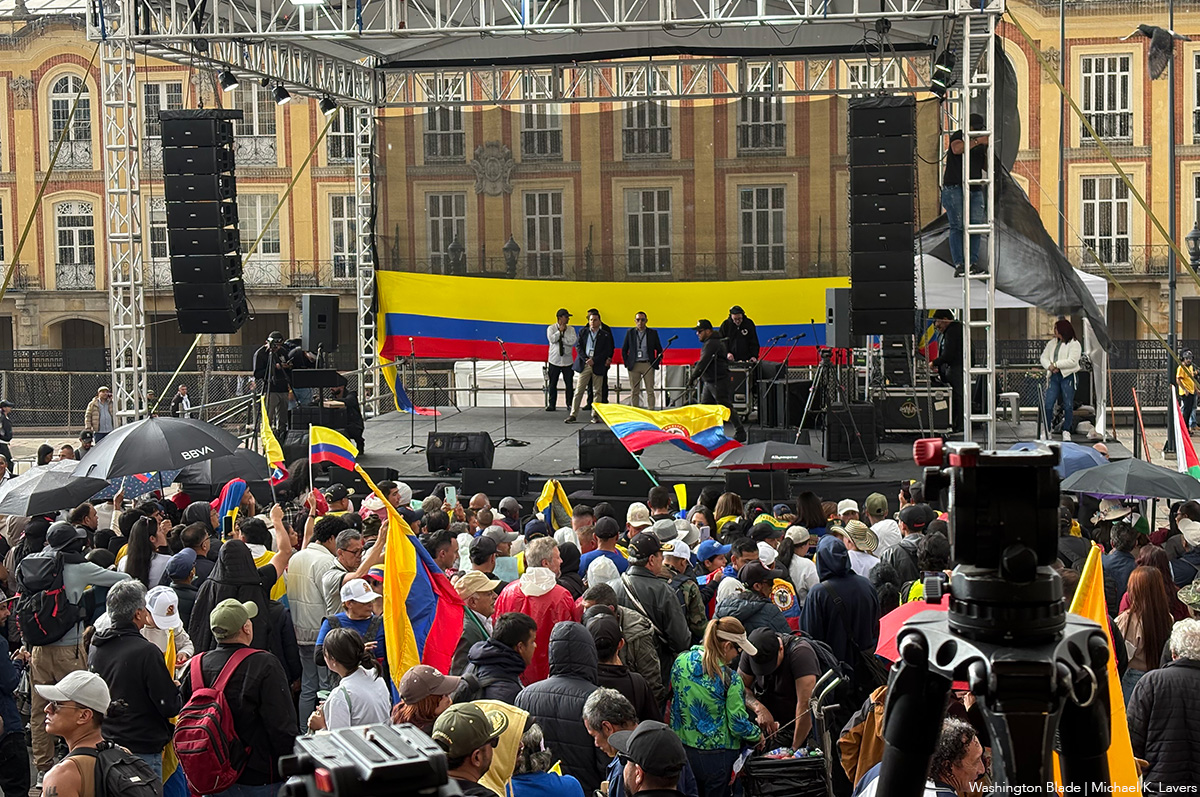South America
Peruvian capital’s mayor-elect raises eyebrows among LGBTQ activists
Rafael López Aliaga is an Opus Dei member

Lima earlier this month elected a new mayor to lead Peru’s most populous city.
Rafael López Aliaga, a conservative businessman, narrowly defeated his opponent in a campaign marked by fervent opposition to communism and progressive values. After his victory, Lima’s LGBTQ community may have cause for concern.
A devout Catholic, López, also known as RLA, is a member of Opus Dei who has practiced self-flagellation and celibacy ever since he joined the conservative Catholic sect when he was 19-years-old.
“Just as a homosexual cannot impose his life on anyone, so too he would be crazy to impose his beliefs on all of Peru,” López has said.
However, his views on social issues closely mirror rightwing Christian doctrine.
He is staunchly against abortion, marriage equality and “gender ideology” and has railed against all three on Twitter. He has also decried the supposed “homosexualization” of Peruvian children.
The mayor-elect, though, is perhaps distinct in some respects among conservative politicians on the continent.
López has endorsed domestic partnerships for same-sex couples and has claimed he would hire a “transsexual” if they were the best person for the job. López has also contrasted himself from Brazilian President Jair Bolsonaro.
“Bolsonaro insults the gay community,” López has said. “I am inclusive, the community must be welcomed.”
The veracity of his “inclusivity,” though, is up for debate.
Peruvian writer and political scientist José Alejandro Godoy is unconvinced.
He told the Washington Blade that López has been cautious with regard to what he is saying on LGBTQ-related topics. Godoy fears that with López’s election, a rollback of LGBTQ human rights is imminent. According to the political scientist, anti-discrimination ordinances and the permissions granted to Lima’s Pride Parade may be on the line.
Indeed, there is reason to believe that the fight for LGBTQ rights in Lima is taking a turn for the worse.
Throughout October, Lima has been a hotbed of anti-trans activism. Coordinated in part by leading members of Congress and Popular Renewal, López’s political party, the city has experienced “anti-gender ideology and pro-family” protests.
Popular Renewal Congressman Alejandro Muñante, who is the Peruvian Congress’ third vice president, and CitizenGO, a rightwing activist group, on Oct. 3 managed to get a truck to enter the front of Peru’s parliamentary headquarters with the message: “OAS: Women are defined by biology, not by ideology.”
Targeting the Organization of American States at its 52nd General Assembly, Muñante and CitizenGO have been campaigning against international efforts to push for a more diverse definition of gender. The following day, on Oct. 4, Popular Renewal sent a letter to the Peruvian Foreign Minister opposing abortion and rejecting any OAS document which may force Peru to “grant improper recognition to transsexual men and grant them the rights of women.” Finally, on Oct. 6, thousands took to the streets of Lima, marching against abortion and gender ideology. Muñante promoted the march and López retweeted coverage of it.
Jazmín Peña-Laurencio, a Peruvian human rights defense attorney, believes the LGBTQ community in Lima should not lose hope.
Municipal ordinances that protect against gender and LGBTQ discrimination have been hard-won by the community, she explains.
“Although Congress does have the power to eliminate these protections, the citizenry would not allow it, as the problem [of LGBTQ discrimination] has been made very visible compared with a few years ago,” she said.
Peña-Laurencio said the community should continue fighting for visibility, as that allows many sectors of society to join the fight and not see LGBTQ discrimination as a niche issue. Activists from Lima agree with the lawyer’s approach.
Manuel Ramirez-Gomez, an activist from Lima and host of a popular LGBTQ podcast, is similarly optimistic about the future of his city. He says that López’s election is nothing new; his community has always felt fear as minorities in the conservative city. However, according to the podcaster; LGBTQ activists in Lima plan to continue organizing, marching and fighting until their rights are fully recognized.
Enrique Vega-Dávila, a queer pastor and academic, echoes Ramirez-Gomez’s sentiment.
“This is not the first time we’ve had a diversity-phobic mayor,” Vega-Dávila told the Blade. “LGBTTTIQ activism has never been easy in Peru. The conservative society in our country has made the closet an alternative to the possibility of fighting for our rights. The RLA administration will surely try to undermine our right to appear in public spaces, but we have been fighting anti-human rights groups for a long time and will continue to do so.”
Despite the activists’ efforts, not all are as optimistic about the possibility for progress in Lima under a López administration.
Godoy explained to the Blade that Popular Renewal won a majority in Lima’s Metropolitan Council (El Concejo Metropolitano.)
“Unfortunately, I don’t think any progress towards LGBTI rights in Lima is currently possible,” Godoy told the Blade. “I’m not only saying this because of Popular Renewal’s majority but also due to the fact that other parties who have won seats have not been inclined to defend the LGBTI agenda.”
Combined with President Pedro Castillo’s unsympathetic, leftist federal administration, the prospects for Lima’s LGBTQ community are not looking bright.
López is set to replace Lima’s incumbent mayor when his term ends on Dec. 31.
Venezuela
AHF client in Venezuela welcomes Maduro’s ouster
‘This is truly something we’ve been waiting for’ for decades

An AIDS Healthcare Foundation client who lives in Venezuela told the Washington Blade he welcomes the ouster of his country’s former president.
The client, who asked the Blade to remain anonymous, on Thursday said he felt “joy” when he heard the news that American forces seized Nicolás Maduro and his wife, Cilia Flores, at their home in Caracas, the Venezuelan capital, during an overnight operation on Jan. 3.
“This is truly something we’ve been waiting for for 26 or 27 years,” the AHF client told the Blade.
Hugo Chávez became Venezuela’s president in 1999. Maduro succeeded him in 2013 after he died.
“I’ve always been in opposition,” said the AHF client, who stressed he was speaking to the Blade in his personal capacity and not as an AHF representative. “I’ve never agreed with the government. When I heard the news, well, you can imagine.”
He added he has “high hopes that this country will truly change, which is what it needed.”
“This means getting rid of this regime, so that American and foreign companies can invest here and Venezuela can become what it used to be, the Venezuela of the past,” he said.
The AHF client lives near the Colombia-Venezuela border. He is among the hundreds of Venezuelans who receive care at AHF’s clinic in Cúcuta, a Colombian city near the Táchira River that marks the border between the two countries.
The Simón Bolívar Bridge on the Colombia-Venezuela border on May 14, 2019. (Washington Blade video by Michael K. Lavers)
The AHF client praised U.S. President Donald Trump and reiterated his support for the Jan. 3 operation.
“It was the only way that they could go,” he said.
The Venezuelan National Assembly on Jan. 4 swore in Delcy Rodríguez, who was Maduro’s vice president, as the country’s acting president. The AHF client with whom the Blade spoke said he is “very optimistic” about Venezuela’s future, even though the regime remains in power.
“With Maduro leaving, the regime has a certain air about it,” he said. “I think this will be a huge improvement for everyone.”
“We’re watching,” he added. “The actions that the United States government is going to implement regarding Venezuela give us hope that things will change.”
Colombia
Colombians protest against Trump after he threatened country’s president
Tens of thousands protested the US president in Bogotá

BOGOTÁ, Colombia — Tens of thousands of people on Wednesday gathered in the Colombian capital to protest against President Donald Trump after he threatened Colombian President Gustavo Petro.
The protesters who gathered in Plaza Bolívar in Bogotá held signs that read, among other things, “Yankees go home” and “Petro is not alone.” Petro is among those who spoke.
The Bogotá protest took place four days after American forces seized now former Venezuelan President Nicolás Maduro and his wife, Cilia Flores, at their home in Caracas, the Venezuelan capital, during an overnight operation.
The Venezuelan National Assembly on Sunday swore in Delcy Rodríguez, who was Maduro’s vice president, as the country’s acting president. Maduro and Flores on Monday pleaded not guilty to federal drug charges in New York.
Trump on Sunday suggested the U.S. will target Petro, a former Bogotá mayor and senator who was once a member of the M-19 guerrilla movement that disbanded in the 1990s. Claudia López, a former senator who would become the country’s first female and first lesbian president if she wins Colombia’s presidential election that will take place later this year, is among those who criticized Trump’s comments.
The Bogotá protest is among hundreds against Trump that took place across Colombia on Wednesday.
Petro on Wednesday night said he and Trump spoke on the phone. Trump in a Truth Social post confirmed he and his Colombian counterpart had spoken.
“It was a great honor to speak with the president of Colombia, Gustavo Petro, who called to explain the situation of drugs and other disagreements that we have had,” wrote Trump. “I appreciated his call and tone, and look forward to meeting him in the near future. Arrangements are being made between Secretary of State Marco Rubio and the foreign minister of Colombia. The meeting will take place in the White House in Washington, D.C.”

Colombia
Gay Venezuelan man who fled to Colombia uncertain about homeland’s future
Heberth Aguirre left Maracaibo in 2018

BOGOTÁ, Colombia — A gay Venezuelan man who has lived in Colombia since 2018 says he feels uncertain about his homeland’s future after the U.S. seized now former Venezuelan President Nicolás Maduro.
“On one hand I can feel happy, but on the other hand I feel very concerned,” Heberth Aguirre told the Washington Blade on Tuesday during an interview at a shopping mall in Bogotá, the Colombian capital.
Aguirre, 35, is from Maracaibo, Venezuela’s second-largest city that is the heart of the country’s oil industry.
He developed cultural and art initiatives for the Zulia State government.
“Little by little, I suddenly became involved in politics because, in a way, you had to be involved,” recalled Aguirre. “It was necessary to be involved because the regime often said so.”
“I basically felt like I was working for the citizens, but with this deeply ingrained rule we had to be on their side, on the side of the Maduro and (former President Hugo) Chávez regime,” he added.
Maduro in 2013 became Venezuela’s president after Chávez died.
“There are things I don’t support about the regime,” Aguirre told the Blade. “There are other things that were nice in theory, but it turned out that they didn’t work when we put them into practice.”
Aguirre noted the Maduro government implemented “a lot of laws.” He also said he and other LGBTQ Venezuelans didn’t “have any kind of guarantee for our lives in general.”
“That also exposed you in a way,” said Aguirre. “You felt somewhat protected by working with them (the government), but it wasn’t entirely true.”
Aguirre, 35, studied graphic design at the University of Zulia in Maracaibo. He said he eventually withdrew after soldiers, members of Venezuela’s Bolivarian National Guard, and police officers opened fire on students.
“That happened many times, to the point where I said I couldn’t keep risking my life,” Aguirre told the Blade. “It hurt me to see what was happening, and it hurt me to have lost my place at the university.”
Venezuela’s economic crisis and increased insecurity prompted Aguirre to leave the country in 2018. He entered Colombia at the Simón Bolívar Bridge near the city of Cúcuta in the country’s Norte de Santander Province.
“If you thought differently, they (the Venezuelan government) would come after you or make you disappear, and nobody would do anything about it,” said Aguirre in response to the Blade’s question about why he left Venezuela.
The Simón Bolívar Bridge on the Colombia-Venezuela border on May 14, 2019. (Washington Blade video by Michael K. Lavers)
Aguirre spoke with the Blade three days after American forces seized Maduro and his wife, Cilia Flores, at their home in Caracas, the Venezuelan capital, during an overnight operation.
The Venezuelan National Assembly on Sunday swore in Delcy Rodríguez, who was Maduro’s vice president, as the country’s acting president. Maduro and Flores on Monday pleaded not guilty to federal drug charges in New York.
President Donald Trump on Tuesday in a Truth Social post said Venezuela’s interim authorities “will be turning over between 30 and 50 million barrels of high quality, sanctioned oil, to the United States of America.”
“This oil will be sold at its market price, and that money will be controlled by me, as president of the United States of America, to ensure it is used to benefit the people of Venezuela and the United States,” wrote Trump.
Trump on Sunday suggested the U.S. will target Colombian President Gustavo Petro, a former Bogotá mayor and senator who was once a member of the M-19 guerrilla movement that disbanded in the 1990s.
Petro has urged Colombians to take to the streets on Wednesday and “defend national sovereignty.” Claudia López, a former senator who would become the country’s first female and first lesbian president if she wins Colombia’s presidential election that will take place later this year, is among those who criticized Trump’s comments.
“Let’s be clear: Trump doesn’t care about the humanitarian aspect,” said Aguirre when the Blade asked him about Trump. “We can’t portray him as Venezuela’s savior.”
Meanwhile, Aguirre said his relatives in Maracaibo remain afraid of what will happen in the wake of Maduro’s ouster.
“My family is honestly keeping quiet,” he said. “They don’t post anything online. They don’t go out to participate in marches or celebrations.”
“Imagine them being at the epicenter, in the eye of the hurricane,” added Aguirre. “They are right in the middle of all the problems, so it’s perfectly understandable that they don’t want to say anything.”
‘I never in my life thought I would have to emigrate’
Aguirre has built a new life in Bogotá.
He founded Mesa Distrital LGBTIQ+ de Jóvenes y Estudiantes, a group that works with migrants from Venezuela and other countries and internally placed Colombians, during the COVID-19 pandemic. Aguirre told the Blade he launched the group “with the need to contribute to the general population, not just in Colombia.”
Aguirre met his husband, an American from California, at a Bogotá church in December 2020 during a Christmas event that SDA Kinship Colombia, an LGBTQ group, organized. A Utah judge virtually officiated their wedding on July 12, 2024.
“I love Colombia, I love Bogotá,” said Aguirre. “I love everything I’ve experienced because I feel it has helped me grow.”
He once again stressed he does not know what a post-Maduro Venezuela will look like.
“As a Venezuelan, I experienced the wonders of that country,” said Aguirre. “I never in my life thought I would have to emigrate.”
The Colombian government’s Permiso por Protección Temporal program allows Aguirre and other Venezuelans who have sought refuge in Colombia to live in the country for up to 10 years. Aguirre reiterated his love for Colombia, but he told the Blade that he would like to return to Venezuela and help rebuild the country.
“I wish this would be over in five years, that we could return to our country, that we could go back and even return with more skills acquired abroad,” Aguirre told the Blade. “Many of us received training. Many of us studied a lot. We connected with organizations that formed networks, which enriched us as individuals and as professionals.”
“Returning would be wonderful,” he added. “What we’ve built abroad will almost certainly serve to enrich the country.”




















